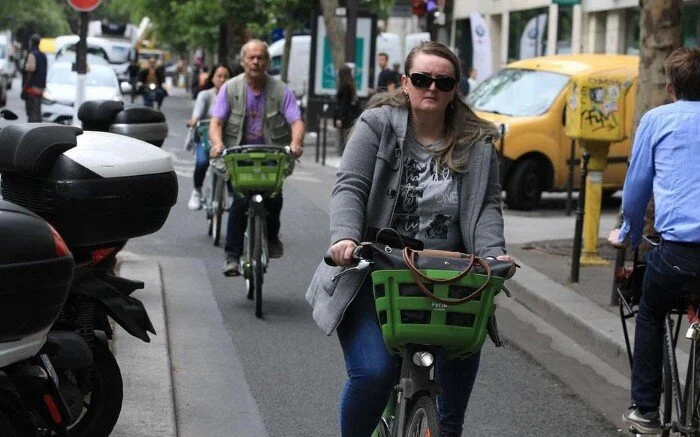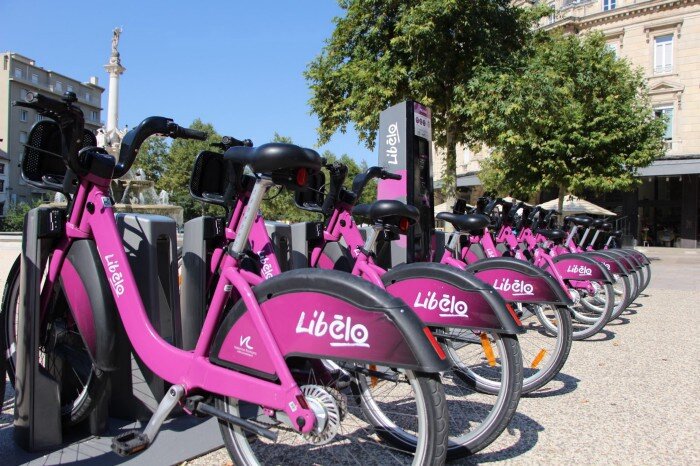Bike sharing, a French success story that continues to grow in cities
At Qucit, we have been working for more than five years to improve bike sharing systems. We have written extensively about bike share systems (from the different modes of use in cities to the fairly recent growth of e-bike share systems). It is clear that cycling is one of the major topics today in the world of urban mobility!
“Don’t let the car come back” said in May 2020 Elisabeth Borne, then Minister of Ecological Transition in France. Once the lockdown was over, a major challenge was faced by cities: how to ensure that the French do not turn to their private cars?
More than ever, shared mobility, and particularly bike sharing, is emerging as one of the best alternative modes of transportation. As they require relatively small amounts of space and do not pollute, bike-sharing systems continue to emerge and develop in French cities and towns. These systems are fully integrated into urban mobility.
The French way of bike sharing
A bike share system, allows the availability of borrowable bicycles anywhere in a city. The model has attracted users from all over the world: practical, no theft, no parking problems and no maintenance to be carried out. The first French form of bike sharing system appeared in La Rochelle in the 1970s: 350 free “yellow” bicycles were made available for free in the streets of the city.
However, it wasn’t until 2005 and 2007 — the respective launches of the Vélo’v in Lyon and Vélib in Paris — that bike sharing trends took off in French cities and the rest of the world.
Today, there are more than fifty cities in France equipped with a bike-sharing system “with station” or with a hybrid form (possibility to lock the bike outside traditional stations). In the world, the number of systems has risen from 13 in 2004 to 1608 in 2018!
Operating a system can be expensive, especially for medium-sized cities, but the amounts are still much lower than the costs of other modes of transport (public transport, especially cars). It represents an interesting alternative in cities that gain many inhabitants every year and whose road network can no longer evolve as in Toulouse.
What is the impact of the Covid crisis on bike sharing systems?
During lockdown
The health crisis due to Covid-19 has had a significant impact on mobility and more particularly on the use of shared bicycles. Many cities in France and abroad have had to shut down their systems such as Montpellier (VéloMagg) . Others have been able to remain active to allow workers to continue their daily trips. Some cities such as Paris have also made bicycles available free of charge. The first hour was free at the beginning for healthcare staff and then for all other front-line employees (hypermarket staff for example).
At the same time, “ Corona-corridors “, temporary arrangements have appeared to allow care staff to move around during lockdown in soft mode and other users as soon as the lockdown was over.
The deconfinement
It is at the end of the lockdown that behaviors were changed. Suspicious of public transportation, users turned to personal but also shared modes of transportation. In China, for example, which experienced a deconfinement a few weeks before France, “the use of shared bicycles has increased 2.5 times in some cities in recent weeks, while metro ridership has fallen by 40%,” notes Joël Hazan of the Boston Consulting Group.
Vélib’ has been breaking its usage records since the deconfinement. LP/Olivier Lejeune
In Paris, bicycles are one of the big winners of the year 2020. Already reinforced by the transport strikes of December 2019, it is the deconfinement that has accelerated usage. There were more than 15,000 additional annual subscriptions and the service achieved a peak usage of 209,700 trips in one day at the start of September! The 400,000 subscriber milestone was also surpassed in September.
In Bordeaux, the use of VCUBs during deconfinement increased by 30% compared to normal.
This increase in the use of VLS goes hand in hand with the explosion in the number of journeys made by bike, whether personal or not, as shown by these curves of user activity in the Géovélo application (GPS bike guidance application)
Monthly activity in Bordeaux and Paris since January 2019 with two major events: transport strike and deconfinement
According to Vélo & Territoires, the post-confinement period (from May 11 to August 30) has seen a 29% increase in bike traffic on French cycling infrastructures compared to 2019!
What opportunities?
Since its launch in the early 2000s, bike-sharing has continued to evolve and become more reliable: better coverage of stations, easier use via smartphone or multimodal card, subscriptions at attractive rates. Today, other innovations are in the pipeline and are intended to ensure its continued use:
Electric bike sharing is a success
The Libélo, a bike sharing system in Valence and Romans, about 30% of the fleet is electric.
According to operators, the introduction of e-bikes in bike sharing has led to a 2.5 to 3-fold increase in usage for some of the cities equipped. It seems that users do not choose e-bikes simply out of curiosity. Electric bicycles offer significant advantages over mechanical bicycles. These advantages transform the behavior of users and improve the perception of safety: people are less afraid to impose themselves on the road, since the speed is comparable to the speed of cars in urban centers. In cities with less marked topography, such as Bordeaux or Calais, mechanical bicycles are still popular.
In Paris, 40% of the bikes are electric but they represent more than 57% of the trips (a mechanical bike is borrowed on average 8 times, compared to 10 to 15 times for the electric bike!) On the other hand, this increase in the share of trips made by electric bikes generates additional maintenance costs and not all batteries have time to recharge when the bike is used up to 20 times a day.
In Nice, the newly implemented E-Velo Bleu service seems to be off to a good start. Independent of the mechanical bicycle system, it has a growing number of subscribers, many of whom are former users of mechanical bicycles. This is also the case in Lyon, which is already reporting good figures despite the effects of containment.
And the trend is not downward. Toulouse Métropole, for example, is starting to think about the second version of the Vélô — and this one will probably be electric!
Hybridization of systems:
The systems also tend to hybridize: if the year 2018 was marked by the arrival of “dockless” forms of shared vehicles (without stations), traditional Bike sharing systems can take comparable forms with overflow (possibility of leaving the bike near the station, even if it is full).
There are also removable station solutions, which are easy to install for events, which often necessitate shared bikes. For example, this is currently a major focus of attention in metropolitan Lyon.
To go further
It is worth remembering that it is certainly not enough to have an attractive, cheap and reliable bike sharing system to guarantee an increase in the number of users (and ultimately the modal share of the bicycle). Users who rent bicycles want to use them on safe and separate infrastructures.
An example of the bicycle express network in Rennes
As with car traffic, induced demand applies to bicycle policies: “Build it and they will come,” they say. Moreover, coupling a bike sharing system with other devices (long-term loan, purchase assistance) is relevant to get city dwellers back on the road! Note also that a bike sharing system allows commuters to test the bike solution for their home-to-work trips. Very often, these same users equip themselves with a personal bike if they have secure parking spaces available.
To be noted:
A group made up of CEREMA, ADEME, the consulting firm INDIGO and the company SMOOVE, is working on updating and recording data on VLS services active in France. You can find the study on the Villes Cyclables website.
Acknowledgements
Thanks to the local authorities that answered our questions for writing this article: Grand Lyon, Toulouse Métropole, Nice Métropole, Principality of Monaco, Valence Romans Déplacements, Syndicat Intercommunal des Transports urbains de l’Agglomération du Calaisis.
Sources:
https://www.phocuswire.com/bike-sharing-on-rise-as-covid-hits-transit-demand
https://fr.wikipedia.org/wiki/Liste_des_syst%C3%A8mes_de_v%C3%A9los_en_libre-service_en_France
http://umap.openstreetmap.fr/fr/map/services-velo_462189#7/48.426/-4.911
https://www.cerema.fr/fr/actualites/velos-libre-service-station-etude-faisabilite-du-service-sa





